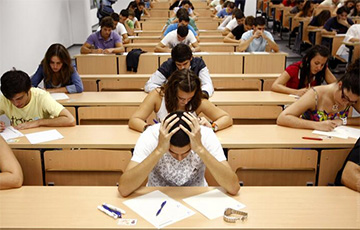Belarusian Universities Accepting Everyone?
24- 15.08.2022, 8:20
- 10,038

How can enrolment of low-performing students end?
There are still few school graduates, while the number of places at universities is plentiful. However, many students have stopped seeking admission to Belarusian universities, which provokes shortages in many specialties, writes thinktanks.by.
The entrance campaign to the Belarusian universities was over on August 10 with the admission for all forms of education. Admission of documents for fee-paying studies was longer than usual - three weeks from July 18 to August 8. There are dozens of vacant places in almost all the universities. Many universities have announced additional places for admission.
Low-performing students are entering universities
The Ministry of Education reports that budget-funded admission to universities has been fulfilled by almost 100%, and paid admission by 95%.
What does this mean? Virtually everyone who wants to study has been accepted to universities, and there are still places left! There was little or no competition for most of the specialties.
According to a famous Belarusian teacher, tutor in physics and mathematics Yauhen Liviant, "the admission campaign to universities has failed for the second year in a row".
"Applicants with 250 points out of 400, i.e. low-performing students by Soviet standards, who finished only nine out of eleven grades, could apply for virtually any field of study," said the expert.
He explains what it takes to get 250 points on four tests altogether. That's 70 +60+60+60, for example.
Let the average score of an applicant's certificate be 7, which means 70 points for the admission campaign. "Now only low-performing students have such an average score, 'solid losers' by the standards of the Soviet school," says the expert.
Suppose an applicant scores 60 points on each of the three CTs. Under the modern system of calculating, 60 points can be obtained by an applicant who has mastered only 20-25% of the school curriculum. In other words, his knowledge is not higher than that of a ninth-grader who studies quite average.
"All this means that a lot of students have been admitted to universities who are not able to master even the 1st year curriculum. This means that either they will be expelled, or they themselves will leave, or they will be dragged by the ears to the very last, so that universities are not left without students and, therefore, without funding and teachers," explains Yauhen Liviant.
All the same, some specialties will inevitably have to be closed or combined with other specialties.
The expert brings as an example one of the leading universities of the country - BNTU. The Department of Automobile and Tractor Engineering has 295 budget-funded places, but there are 170 applicants with grades over 250. There are 26 places at the paying department and all applicants have the sum of scores less than 250 (ten of them have scores less than 200!!!).
"That means that half of the 321 freshmen are not able to understand even the first lecture in higher mathematics or physics, or rather they would hardly understand anything even during a 10th grade mathematics class."
The situation is similar or even worse in most higher education institutions in the country, according to the expert.
Too few schoolchildren?
On the face of it, the reason is that we have too many places in higher education and not enough school leavers. A few days ago, the Minister of Education explained the situation by saying that "this year there are 52 thousand 11th grade graduates. A total of 61 thousand young people were tested, including graduates of previous years. And there are a total of 53.5 thousand state-financed and non-state-financed places this year. Let's see for ourselves how relevant migration is.
However, Yauhen Liviant responds with statistics from previous years on the ratio of school leavers, places in universities for first-year students and applicants. The data are given in the chart.
We see that in 2016 the number of all applicants exceeded the number of places in universities by 1.6 times, and then this ratio has steadily decreased and became 1.14 this year.
School leavers have been few for a long time, but now they do not want to go to Belarusian universities
"In my opinion, this fact means that the number of those who want to study at Belarusian universities is steadily decreasing," Yauhen Liviant concludes from the statistical data.
In his opinion, a lot of applicants pass the CT but do not apply to our universities. The question arises: why pass the CT in such a case?
The answer is simple: using our CT results, you can apply for studies in universities in other countries, especially in Poland and Russia, and more and more applicants use this opportunity every year, which is not surprising.
It is not surprising that more and more applicants from Belarus can apply for admission to just one university in our country; to do it they have to come to the admission office in person several times in July and August. However, it's not necessary to go anywhere to apply to five Russian universities, just go to the Russian site of public services. Moreover, it is possible to take part in the Olympiads of the Russian universities, which are often no more difficult than the CT, and to enter the university in spring.
The situation with Polish universities is similar: applications can be submitted remotely to many universities and admission is based on the results of the CT or the scores on the school diploma.
"Of course, this is a significant, but by no means the only reason for the decline in the prestige of our universities. And considering the fact that this year Lithuanian universities have been actively competing for our applicants, we can expect disappointing results of the admission campaign in the next academic year," the expert warns.








